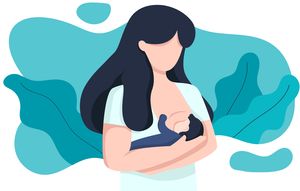IN MAY, the WHO came out with a wonderful 2D hand-drawn animation video by a Mumbai-based film production house to highlight the dos and don’ts of breastfeeding if Covid-19 is suspected or confirmed. These included:
* Washing hands before breastfeeding
* Coughing or sneezing into a tissue and discarding it immediately
* Cleaning and disinfecting surfaces or objects a mother might have touched, including the baby’s toys
* Wearing a mask while carrying or nursing the baby
In the video, the WHO also states that even if a mask is not available, it is recommended that mothers continue to breastfeed as the benefits far outweigh the potential risk of transmitting the virus.
Yes, that’s how powerful a mother’s milk is to her baby.
But what if a mother is suffering from a bout of simple cough, cold or even fever? Then, too, a mother can continue to nurse her baby. In fact, the antibodies that are produced to defend infection in the mother will be passed on to the baby through breast milk. It has now been declared safe to nurse if the mother suffers from typhoid, malaria, tuberculosis, jaundice or leprosy.
It is a fact that medication will enter breast milk as breast milk is synthesised from blood. The good news is that the level of medication in the blood is usually so low as to not cause harm in most cases.
Do note that certain antibiotics may not be suitable for a baby aged below one. Also, pre-term babies find it harder to block influences of medications even after 12 months. So talk to your doctor about your intention to breastfeed and he/she may work around that.
If you really cannot breastfeed your baby, then try to pump your milk at periodic intervals so that supply is maintained and engorgement or hardening of the breasts and subsequent pain do not occur.
Next issue: Infant care―fourth part of the series



